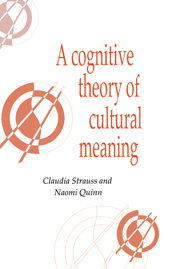5 - Three further properties of culture
Published online by Cambridge University Press: 05 June 2012
Summary
The durability of culture in the individual and its motivational force are not the only properties of culture to be accounted for. The historical durability of culture, its thematicity, and its sharedness, as well as the circumstances under which these properties do not hold, are the topics of this chapter. Some of the arguments and assumptions developed in the detailed discussion of the previous chapter have paved the way for discussion in this one.
Historical durability
Something else we recognize about culture is its historical durability – that it can be, and often is, reproduced from one generation to another. This is its third centripetal tendency. Yet, some cultural ideas stay around much, much longer than others, and some do not last even a generation. We next turn to this question of what gets reproduced in the next generation and how.
We point out, in the next section, that historical durability results when the public world is recreated by enactment of the schemas each generation has learned; but also when one generation intentionally transmits its values to the next. We go on to describe how durability across generations is sometimes also promoted by people's deliberate efforts to preserve cherished practices; by the representation of heretofore private matters in public forms, which then preserve and propagate these understandings; or by the storage of cultural understandings in books and like repositories where they may lie dormant over long periods of time before being retrieved and accorded new life. The chapter then turns to circumstances under which, conversely, cultural understandings are unlikely to endure over time.
- Type
- Chapter
- Information
- A Cognitive Theory of Cultural Meaning , pp. 111 - 134Publisher: Cambridge University PressPrint publication year: 1998

